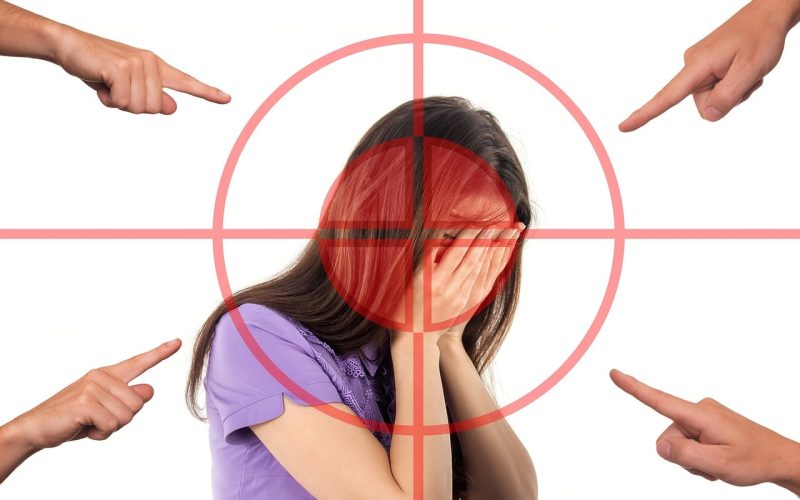It still hurts, right? You feel like you can’t crawl out of that hole childhood bullying has pushed you into.
You believe your confidence has been severely dealt with and is unsalvageable. I’m no therapist, but I’ve researched how to get over childhood bullying.
It’s not something we can talk about or easily share with people, but keeping the trauma locked deep within or suppressing it has a way of ridding us of our joy.
I may not know your struggle as experiences are similar as they are different, but to the best of my ability, I’d love to reach out and let you know that you’re not alone.
What is Bullying?
Bullying is a repeated aggressive behavior where an individual or a group of individuals in a position of power deliberately abuse, intimidate, or coerce a person with the intent to hurt that person emotionally, physically, or mentally.
Bullying can be verbal or physical. Many youngsters can be pretty mean to each other during childhood, adolescence, and as they grow into adulthood.
While these interactions are unappealing, there is a fine line between bullying and conflict.
Events of bullying must include these three attributes:
- Intentional- when the behavior is aggressive and deliberate in an attempt to hurt someone
- Repetitive- when the above action is frequently done to the same person or group over time.
- Power Imbalance- when the bully has more social or physical power than the child or children being bullied.
The exposure to bullying varies. There are four types of bullying, which can occur separately or simultaneously:
- Physical bullying, such as pushing and kicking
- Verbal bullying, such as yelling, abusing, and name-calling
- Relational bullying, such as spreading rumors and excluding
- Cyberbullying involves threats and sending hurtful messages publicly or privately through digital devices.
Where Does Exposure to Bullying Occur?
Anywhere! From the parks, elementary school buses, and classrooms to cafeterias, gym rooms, and sports fields.
Although bullies carry out their intentions behind closed doors, the brazen ones do it in public and in the presence of their peers, just like in movies.
Well, as you know, cyberbullying occurs through the internet. Loads of people have been run down and made to feel worthless with the way they dress, speak, their religion, belief, culture, and even their skin color by individuals who are in no form more superior to them.
Even adults are victims of bullying. Regardless of age, a bully will go the extra mile to see that they make people feel lesser.
They’d do anything to feel stronger, more powerful, and better about themselves, to the detriment of their fellow humans.
Who is a Potential Bully?
You and I. It may be intentional or unintentional, but we may have, in many ways than one, hurt someone’s feelings continually.
We find bullies in offices, schools, the government, our peers, teachers, friends, family members, co-workers, you name them.
They are everywhere. They may or may not know that they are causing you pain.
How Does Adverse Childhood Experience Affect Adulthood?
The adverse effects of bullying on adults cannot be exhausted, but I’ll try to cover the major ones in the table below.
| 1. Developmental Delays and Disruption | They include mental health impairments such as the abnormal working of the brain’s memory, exception functions, self-control, cognitive flexibility, and poor cognitive and language development. |
| 2. Physical Health Problems and Diseases | This covers psychosomatic illnesses, stomachaches, chronic pains, headaches, diabetes, lung diseases, obesity, anorexia, migraines, and more. |
| 3. Depression and Depressive Disorders | These are feelings of emptiness, sadness, emotional numbness, anxiety, suicidal behavior, and death. |
| 4. PTSD and Complex PTSD | Depression, suicidal behaviors and thoughts, defiant behavior, alcohol, and substance abuse. |
| 5. Low Self-Esteem and Lack of Confidence | Self-loathe, self-doubt, inferiority complex, negative self-talk, lack of a sense of self, negative self-image, self-consciousness, and overwhelming insecurities. You’d have trouble knowing who you are or what you need. You’d constantly grovel for external validation, have trouble creating boundaries, care more for others than yourself, use the reaction of others to gauge how you should feel and be a people pleaser. |
| 6. Guilt, Shame, and Self-Blame | This is a belief that you are responsible for or deserve the years of abuse you faced. |
| 7. Sleeping Disorders | Constant nightmares, insomnia, altered sleep cycle, sleep disturbances, and hypervigilance. |
| 8. Trust and Intimacy Issues | You’d have trouble trusting people or getting close to others due to the fear of getting hurt or abused. You may believe you don’t deserve love or affection from people. On the flip side, you may have trouble keeping relationships because of being too intrusive and over-sharing. Fear of abandonment may lead you to make ungenuine and superficial personal and social relationships. You’d frequently hold on to toxic or unhealthy companionship. |
| 9. Triggers and Frequent Flashbacks | Talking about your abuse or encountering things, smells, tastes, sounds, and textures from the past may trigger flashbacks, leading to extreme anxiety. |
| 10. Perfectionism | You’d often struggle with overachieving and perfectionism. You’d set impossible standards to overcome the belief that you’re a failure. Perfectionism is often triggered when you are given accolades for excelling in something. |
| 11. Avoidance and Social Isolation | This includes postponing issues that must be dealt with, which will pile up and create additional anxiety, stress, and many other problems. Many individuals exhibit antisocial behaviors where they isolate themselves from society because of unacceptance and stigmatization but may feel lonely and helpless. |
| 12. Self-Sabotaging Behavior | This is the unconscious or unintentional self-sabotage to reinforce the belief that you amount to nothing. This may come from poor academic performance, delinquent behavior, suicidal behavior, and substance abuse. |
| 13. Unhealthy Sexual Practices and Sexual Problems | Engaging in risky sexual behaviors such as multiple sex partners. |
| 14. Becoming a Bully Yourself | You may tend to be abusive to other people who are weaker than you as a form of revenge for what you may have gone through. |
Bullying is real, and it’s deadly. Yes, people give up on life due to depression and the long-term effects of torment.
So, try learning a skill next time you feel like gaining power and feeling good about yourself.
How to Get Over Childhood Bullying?
As much as many people are rising against bullying, many are still in the act, and a lot more are chronic victims.
That is why I am joining the rest of the world in letting you know and believe that you are not defective.
You are worth more than you give yourself credit. You may not realize it yet, but this article will help you heal.
Below are 11 ways how to get over childhood bullying.
1. Recognize That You Are Not Alone
It is estimated that 1 in 5 students were victims of bullying during their school years.
Although each experience is unique, know you are not alone in your struggles.
Talking with friends or family members about your experiences can help immensely – especially if they have gone through similar challenges themselves.
2. Focus on the Positive
Bullying can make it challenging to look at ourselves positively due to the constant negativity associated with it.
To start countering these negative thoughts, write down two positive things about yourself every day – even if they are small achievements, such as getting out of bed on time every morning or learning a new skill.
Focusing on the positive aspects of yourself will help build self-confidence and make it easier to let go of any ill feelings related to your experiences with bullying.
3. Seek Professional Support
If the emotions associated with your childhood bully are still affecting you today, seeking support from healthcare professionals may be beneficial.
This could include counseling sessions designed specifically for those dealing with childhood trauma.
You can also participate in group therapy. Here, you can discuss feelings commonly reported by bullying survivors, such as low self-worth and anxiety.
4. Choose Compassion Over Revenge
When considering how you want to react when confronted by former bullies in adulthood, choose compassion instead of revenge when given an opportunity.
Revenge only perpetuates hate and hurtful behavior towards others and yourself, which can damage personal and social relationships even further than they already were.
Choosing love over fear leads us down paths full of healing and gratitude, which ultimately helps us move forward with our lives more confidently and healthily than ever before!
5. Take Time to Process Your Emotions
It is essential to give yourself time and space to feel your feelings without judgment. Take deep breaths, go for a walk, or sit in silence and let yourself feel whatever comes up.
Accepting your emotions can be the first step in healing from the long-term effects of bullying.
6. Acknowledge the Emotions You Are Feeling
Acknowledging the emotions related to the trauma of being bullied is an important step in overcoming childhood bullying effects.
Find supportive people to help you navigate and identify your thoughts and feelings so that these emotions don’t overwhelm you or seem unmanageable.
7. Learn Healthy Coping Strategies
Developing healthier coping strategies to deal with negative emotions, such as relaxation techniques or exercise, is vital for managing emotional distress due to experiences with bullying.
Experimenting with different activities can help you find something that works for you.
8. Vent Smartly Online
Social media outlets such as Twitter and Reddit offer anonymous forums where individuals can express their feelings freely without fear of judgment or stigma.
While venting anonymously online may not directly resolve any trauma associated with childhood bullying, it can be a helpful outlet when faced with frustrating situations or intensely emotional days.
9. Be Patient
It’s easy to become overwhelmed when going through difficult experiences, but it’s crucial to keep an even temperament if possible. At times like this, patience is key.
Let’s give ourselves the time and space needed for healing without feeling rushed.
It fosters open communication, encourages learning vital skills and builds trust between ourselves and our loved ones.
10. Use Writing as an Outlet
Writing about your experience is an effective way to process turbulent emotions.
Through writing, you can put words to the feelings experienced during childhood bullying, enabling release from deep inner struggles.
Writing also allows your mind to integrate better the understanding that any momentary power the bully had over you has been released back into yourself now that they are no longer present in your life.
11. Speak Up Against Bullying
Though speaking up against bullies may seem daunting at first, you’re taking a stand against all forms of bullying – physical, verbal, or digital.
Overcoming fear, speaking up, and participating in bullying interventions can also be empowering.
They allow you to reclaim control over your entire life and assert yourself as an equal among peers.
Conclusion
Change is possible if a sustained effort is applied constantly over time. It may feel hopeless at first, but don’t give up!
The sense of being ‘trapped’ will eventually fade if we hold onto hope for better days ahead—both within ourselves and in our external circumstances (school/home).
Work toward using small steps to achieve goals. It will help you build confidence and provide evidence that progress is happening, even if you don’t feel it.
Keep “bigger pictures” outcomes in sight! Replace negative stories with positive outlooks.
There you have it, folks— effective ways to overcome childhood bullying.








